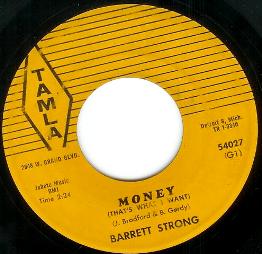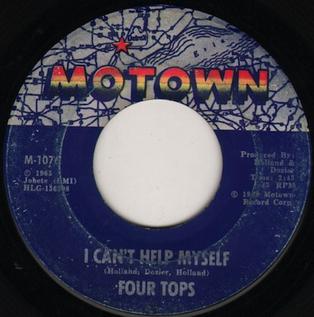The Elgins were an American vocal group on the Motown label, active from the late 1950s to 1967. Their most successful record was "Heaven Must Have Sent You", written and produced by the Holland–Dozier–Holland team, which was a hit in the US in 1966, and in the UK when reissued in 1971.

"Get Ready" is a Motown song written by Smokey Robinson, which resulted in two hit records for the label: a U.S. No. 29 version by The Temptations in 1966, and a U.S. No. 4 version by Rare Earth in 1970. It is significant for being the last song Robinson wrote and produced for the Temptations, due to a deal Berry Gordy made with Norman Whitfield, that if "Get Ready" did not meet with the expected degree of success, then Whitfield's song, "Ain't Too Proud to Beg", would get the next release, which resulted in Whitfield more or less replacing Robinson as the group's producer.

"Money (That's What I Want)" is a rhythm and blues song written by Tamla founder Berry Gordy and Janie Bradford, which was the first hit record for Gordy's Motown enterprise. Barrett Strong recorded it in 1959 as a single for the Tamla label, distributed nationally on Anna Records. Many artists later recorded the tune, including the Beatles in 1963 and the Flying Lizards in 1979.

"I Can't Help Myself" is a 1965 song recorded by the Four Tops for the Motown label.

"Baby I Need Your Loving" is a 1964 hit single recorded by the Four Tops for the Motown label. Written and produced by Motown's main production team Holland–Dozier–Holland, the song was the group's first Motown single and their first pop Top 20 hit, making it to number 11 on the US Billboard Hot 100 and number four in Canada in the fall of 1964. It was also their first million-selling hit single.

"I Want You" is a song written by Leon Ware and Arthur "T-Boy" Ross and performed by American singer and songwriter Marvin Gaye. It was released as a single in 1976 on his fourteenth studio album of the same name (1976) on his Tamla label. The song introduced a change in musical styles for Gaye, who before then had been recording songs with a funk edge. "I Want You", among other similar songs, gave him a disco audience. Ware, who produced the song alongside Gaye, also was attributed with the single's success.

"Please Mr. Postman" is a song written by Georgia Dobbins, William Garrett, Freddie Gorman, Brian Holland and Robert Bateman. It is the debut single by the Marvelettes for the Tamla (Motown) label, notable as the first Motown song to reach the number-one position on the Billboard Hot 100 pop singles chart. The single achieved this position in late 1961; it hit number one on the R&B chart as well. "Please Mr. Postman" became a number-one hit again in early 1975 when The Carpenters' cover of the song reached the top position of the Billboard Hot 100. "Please Mr. Postman" has been covered several times, including by the British rock group the Beatles in 1963. The 2017 song "Feel It Still" by Portugal. The Man draws on "Please Mr. Postman" and includes a credit for Brian Holland.

"Take Me with U" is a song by Prince and the Revolution, and the final US single released from their album, Purple Rain (1984).

Machine Gun is the debut studio album by Commodores, released on July 22, 1974, on Motown Records.

Patricia Eva "Bonnie" Pointer was an American singer, best known for having been a member of the vocal group, the Pointer Sisters. Pointer scored several moderate solo hits after leaving the Pointer Sisters in 1977, including a disco cover of the Elgins' "Heaven Must Have Sent You" which became a U.S. top 20 pop hit on September 1, 1979.

The Boss is the tenth studio album by American singer Diana Ross, released on May 23, 1979, by Motown Records.

"Shadow Dancing" is a disco song performed by English singer-songwriter Andy Gibb. The song was released in April 1978 as the lead single from his second studio album of the same name. The song reached number one for seven consecutive weeks on the Billboard Hot 100 in 1978. Albhy Galuten arranged the song with Barry Gibb. While Andy Gibb would have three more Top 10 hits in the U.S., this would be his final chart-topping hit in the United States. The song became a platinum record.

That's a Plenty is the second studio album by the American female vocal group The Pointer Sisters. It was released in 1974 on Blue Thumb Records.

Priority is the sixth studio album by the Pointer Sisters, released in 1979 on the Planet label.

"With You I'm Born Again" is a 1979 duet written by Carol Connors and David Shire that originated on the soundtrack of the 1979 motion picture Fast Break. It was performed by Motown recording artists Billy Preston and Syreeta Wright and became an international hit for the duo, reaching number four on the Billboard Hot 100 and number two on the UK singles chart.

Rodney Crowell is the third studio album by American country music artist Rodney Crowell. It was released in 1981 by Warner Bros. Records and was his last album on that label before switching to Columbia. It was the first album Crowell produced by himself. It reached #47 on the Top Country Albums chart and #105 on the Billboard 200 albums chart. The songs, "Stars on the Water" and "Victim or a Fool" were released as singles. "Stars on the Water" reached #30 on the Hot Country Songs chart, his highest-charting song up to that point. It peaked at #21 on the Canadian country charts. "Victim or a Fool" reached #34 in the U.S. The album was rereleased on compact disc in 2005 paired with his previous album But What Will the Neighbors Think.
Donald Charles Baldwin is an American musician, arranger, and composer. He achieved significant commercial success with recordings he wrote, arranged, and performed for Motown Records and Invictus/Hot Wax Records from 1970 to 1980. His Notable works include his recordings with many widely known musical acts including: Temptations, Commodores, and Bonnie Pointer, as well as record producers Holland-Dozier-Holland and Jeffrey Bowen.

"Heaven Must Have Sent You" is a song written by Brian Holland, Lamont Dozier, and Eddie Holland when at Motown, and first recorded by The Elgins in 1966. It was also a 1979 disco hit single by Bonnie Pointer.

"How Sweet It Is (To Be Loved by You)" is a song recorded by American soul singer Marvin Gaye from his fifth studio album of the same name (1965). It was written in 1964 by the Motown songwriting team of Holland–Dozier–Holland, and produced by Brian Holland and Lamont Dozier. The song title was inspired by one of the actor and comedian Jackie Gleason's signature phrases, "How Sweet It Is!"

Bonnie Pointer is the debut studio album by Bonnie Pointer, released in 1978 on the Motown label.

















